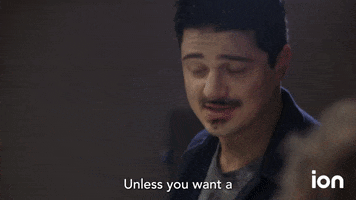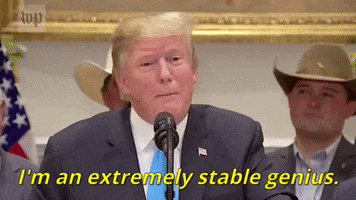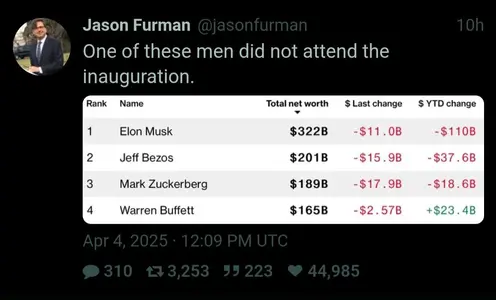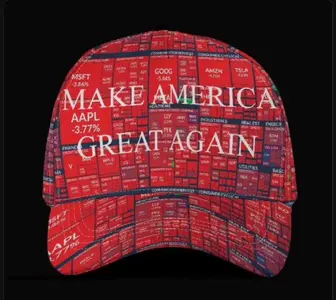Navigation
Install the app
How to install the app on iOS
Follow along with the video below to see how to install our site as a web app on your home screen.
Note: This feature may not be available in some browsers.
More options
You are using an out of date browser. It may not display this or other websites correctly.
You should upgrade or use an alternative browser.
You should upgrade or use an alternative browser.
Economic News
- Thread starter nycfan
- Start date
- Replies: 5K
- Views: 213K
- Politics
- Messages
- 41,508
- Messages
- 1,043
Seeing the DOW next to him while he spews this is surreal and infuriating.
superrific
Master of the ZZLverse
- Messages
- 12,420
Stephen Kapo Miller.This guy is the most eager for a Reichstag. I have no doubt he’s 1. Insider trading, 2. Gleeful in the knowledge that with financial collapse comes social turmoil and 3. With social turmoil comes ample opportunity to manufacture justification for violent repression. Miller has Nazi ideological dna.
lawtig02
Legend of ZZL
- Messages
- 5,894
Oopsies.

The Oil And Gas Workers’ Association Endorses Trump For 2024 Vote | OilPrice.com
The Oil and Gas Workers’ Association has endorsed Donald Trump as their preffered candidate in next year's presidential election.
The Oil and Gas Workers' Association has endorsed former president Donald Trump as their champion in next year's presidential election.
The industry group's president, Matt Coday, noted in an interview with the Daily Mail that Trump had pulled the United States out of the Paris Agreement during his previous term, had also pulled out of the Iran nuclear deal and had made an effort to save U.S. oil and gas jobs.
- Messages
- 1,147
winning
- Messages
- 4,113
Will someone remind little Marco that his president determines the strength of the economy by how well the stock market is doing ?
- Messages
- 4,113
Trump has now officially claimed we have a Trump economy, so no more blaming the Biden economy going forward 

 www.rawstory.com
www.rawstory.com

'Yikes': Conservative WSJ editors floored as White House touts 'roaring economy'
The Wall Street Journal’s conservative editorial board delivered a one-two punch over President Donald Trump’s “tariff blunder” – and the White House’s creative spin of the fallout – as Friday brought the second straight day of steep market losses. The stinging criticism came hours after White...
 www.rawstory.com
www.rawstory.com
- Messages
- 2,394
Silence Dogood
Esteemed Member
- Messages
- 645
- Messages
- 8,290
But this one could have been avoided.
- Messages
- 8,290
Doesn't he mean hank tough?
He does realize those numbers were from before his blunder?
lawtig02
Legend of ZZL
- Messages
- 5,894
Haha! Nice to see you and Trump praising Bidenomics before the impact of the Trump Economy starts to kick in.
- Messages
- 41,508
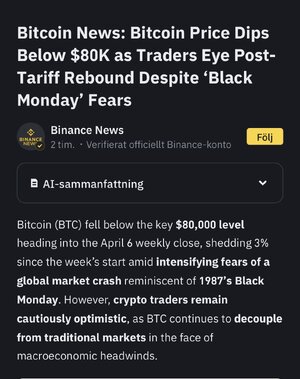
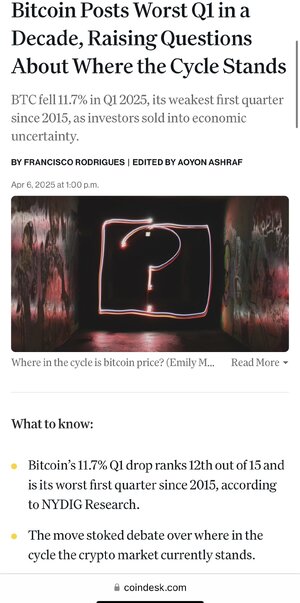

Bitcoin (BTC) Price Posts Worst Q1 in a Decade, Raising Questions About Where the Cycle Stands
BTC fell 11.7% in Q1 2025, its weakest first quarter since 2015, as investors sold into economic uncertainty.
Share:

